Mark O'Byrnes is a regular visitor to the Motorcheck blog. Living in Co. Kildare he has always had a healthy interest in cars and has developed more than a passing interest with the electric motor. So much so that he even installed an electric motor on his bicycle!
In the article below, Mark shares his experiences with us and outlines his 'enthusiasts' opinion on the future of electric motoring.
Electric Bike
First off let me say that I am not a Mechanic or Electrician, more of an enthusiast. Electric cars have always interested me and I have even converted my bicycle to electric. With very impressive results. The torque is amazing and it will do 24mph (max) for 35 miles on a 52 volt 20 amp LiFep04 battery. On its current usage I should get over 35,000 miles life from the battery.
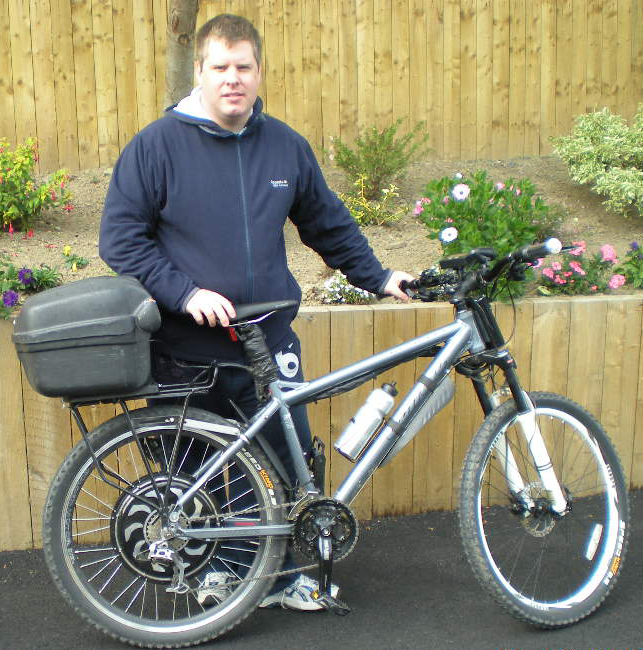
For those of you sniffing at the speed let me explain, the top speed is limited by the battery voltage. It uses a 40 amp controller and it’s really that 40 amps that gives it amazing hill climbing abilities and the fact the motor is wound more for torque. Suits me fine as getting help going up the hill is a real thrill.
Throughout my research in the electric bike arena I've learned a lot about E.V.’s in general and I love to share that knowledge with people have a similar interest. Hence this blog for Motorcheck.ie.
These are exciting times we live in. The battle between the Internal combustion Engine and the Electric car is only just beginning. The first real affordable E.V. (Electric Vehicle) to come to our shores will be the Nissan Leaf with its claimed 100 mile range (though Nissan have admitted that with heavy use of your right foot and the electric heater will see your range drop to 70 miles or less).
In terms of charging - the leaf will take eight hours to charge from empty to full. Most of us will do this at night on a reduced tariff for very little indeed. If I knew what the consumption of the charger was I could work out the exact cost to charge, but the E.S.B say it will be as little as four Euros for a complete empty to full charge.
For most people that travel 100 miles a day, or less, the Leaf will be ideal, but for those who regularly travel more, or like to go for a long trip the odd weekend, then the leaf might not be the one for you. When the charging infrastructure is in place it might not be as much of a problem, especially when more fast chargers are in place, though continuous use of the fast charger will shorten the leaf’s battery life.
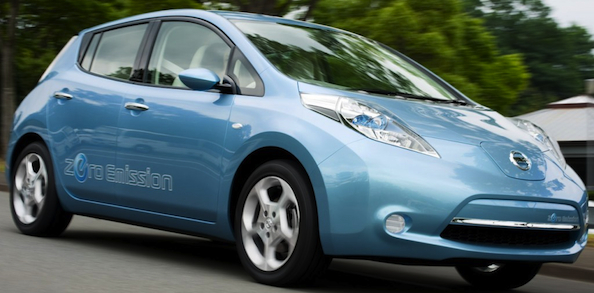
E.V.'s are very efficient around towns and cities where they drive in really slow traffic. A normal petrol or diesel car might get around 25-35 MPG . Electrics will be much more efficient consuming nothing when stopped, only a few watts to maybe 1000 watts or maybe a little more to keep the a/c or heater going, but still it’s much more efficient than running an normal car through high traffic. Here's a quote from Wikipedia on the Tesla roadster “The Roadster's motor efficiency, battery-to-wheel, is 92% on average and 85% at peak power. For comparison, internal combustion engines have a tank-to-wheel efficiency of about 15%.”
Some people think that electric cars are no more environmentally friendly than the combustion engine and that the electricity to charge them comes from fossil fuel sources. Yes even though most of the energy still comes from fossil fuel, E.V.'s are still much more efficient than normal Internal Combustion Engine (ICE) cars, even at high speeds. It's worth noting that power stations have to keep running even at night when power demand is low and it wastes a lot of fuel, charging E.V.'s at night will bring improve the efficiency because the power being generated to keep the steam going for the turbines can be used.
The Battery
Now the science bit - the battery. Batteries have come a long way since lead acid, the one used in your car to start the engine. Lithium batteries are starting to be used in the likes of the Leaf and the Opel Ampera and have a much higher energy density than lead acid, or Nickel metal Hydride batteries (like those found in the Toyota prius hybrid).
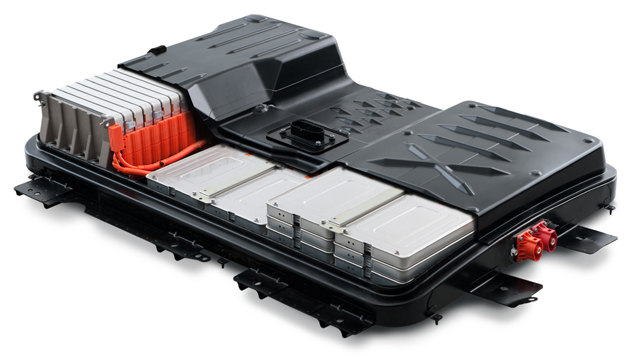 Don't think that because your mobile phone or laptop battery only lasts around 2-3 years, that the same will apply to electric cars. Electric cars have far more sophisticated battery management systems, and never allow 100% discharges or 100% charges!
Don't think that because your mobile phone or laptop battery only lasts around 2-3 years, that the same will apply to electric cars. Electric cars have far more sophisticated battery management systems, and never allow 100% discharges or 100% charges!
It takes around 8 hours to charge the Nissan Leaf from Empty but because the first generation of electric cars are really for town or city drivers the limited range and charging time should not matter much because most people wont drive use the full charge so they won't take the full eight hours to come back to full.
Nissan estimate that the Generation 2 leaf will have a real range of around 200- 300 miles and I can see that as being true with the advances of lithium batteries in the last few years. Nissan use LiMn2O4 lithium batteries in the Leaf and seem happy to say they will go for 1000 full charge discharge cycles. So If the Leaf can travel up to 100 miles @ 1000 cycles, that’s 100,000 miles (or more if you only use 50% of the battery charge and charge every night).
Nissan also offer an 8 year 100,000 mile warranty. Importantly, second hand car buyers will be able to buy the leaf and possibly have the option to buy a new battery and benefit from a longer range battery in a few years time.
Another battery currently in development stage uses silicon nano wire technology which at this stage in development currently offers up to 4 times the capacity of normal lithium batteries. Back in 2007 the battery was expected to be on the market within 5 years. So in 2012 we just might at least have an E.V. battery that can travel up to 400 miles. The silicone nano wire battery offers a theoretical 10 times capacity over normal batteries. So 100 miles x 10 = 1000 miles. But we are some years away from that yet!
And 1000 miles @ 1000 Full (Full to empty) = 1 million miles battery life! And of course most batteries will still have 75 % capacity after that, meaning you can travel at slightly reduced range, or in the case of end of life vehicles, can be used in renewable energy systems!
Opel Ampera
The Opel Ampera is another electric car that will be available in 2011-12 and uses a LiFeP04 lithium battery, it’s a better chemistry and more stable than the one in the Leaf and should last 1000+ cycles, however the Opel Ampera can only travel up to 40 miles in electric, with one major difference, it has a 1.4 L petrol engine that acts as a generator to charge the battery when it runs down so you can continue to travel without any worries about the car stopping and failing to reach your destination (the engine does NOT drive the wheels).
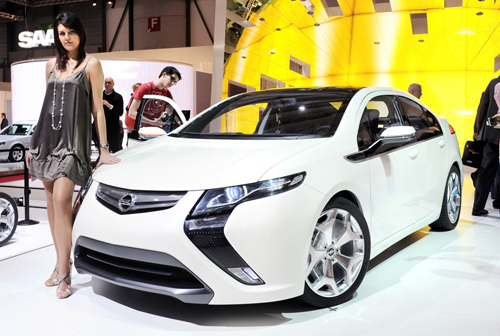
The MPG (estimation) for the Ampera is 280 U.K mpg. I must confess have no idea if that’s in E.V mode or when the generator is running! One thing to note though is that if the Ampera has a E.V range of 40 miles x 1000 cycles = 40000 miles. There is no information as to whether there is more than 1000 cycles expected of the battery developed by A123 systems, However only around 50% of the actual capacity is used in the ampera to prolong battery life by not fully discharging or recharging them, so they could actually last 3000 cycles or more. No one really knows yet!
There is another type of lithium battery called the lithium air battery, which uses an air cathode which basically makes it a lot lighter because of the fact you don’t need a heavier metal cathode! IBM are one company that are investing in lithium air batteries and hope to have a battery with 40 times capacity within the next 5 years from 2010. That might seem a bit over enthusiastic! However, I think most of us could settle for an electric car that can travel up to a real 300-400 miles!
Charging will eventually be the biggest problem, or not, depending on how long you can wait for recharging. Today’s Fast chargers will inevitably slow down as capacities grow more and more. What takes 15-25 minutes now might take an hour or two in the future, still many people might not see it as much of a problem if all they want is enough charge to get home. However charging from home might take a very long time indeed. There are companies working on ultra fast charging EV batteries, but have to ensure it doesn’t shorten battery life by doing so.
Hydrogen & Nuclear Fusion
One thing that will solve the problems of battery charging and range is Hydrogen. Hydrogen reacts in the fuel cell to make electricity to keep the battery charged. Hydrogen has to be extracted from water by using fossil fuel, or Nuclear and requires vast amounts of energy making it very inefficient . It can be done by using renewable energy but most experts agree that the energy would be better put into batteries directly through the grid!
The Holy grail of course, is Nuclear Fusion which uses sea water. There is enough energy in sea water to last over 6 Billion years at our current energy needs! The earth is guaranteed to last for around that before the Sun runs out of it’s own Hydrogen! We are between 20-50 estimated years away from Nuclear fusion, which is much safer than today’s reactors with just tiny amounts of radiation.
The only thing I have against Hydrogen is the fact it will be a lot more expensive than electricity because of governments being able to tax it, suppliers charging what they like etc. Whereas electricity is cheap and easily available. And if you are lucky enough to have a wind turbine installed you can charge for free!
What would I buy?
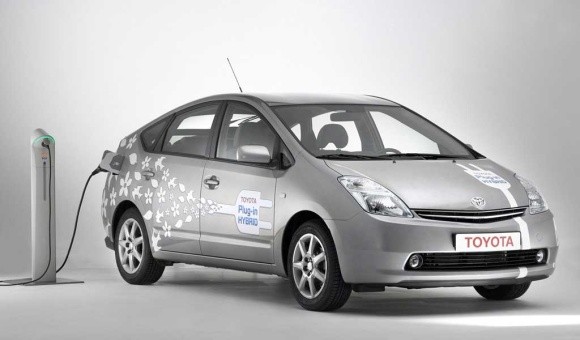
I think if I was to purchase a new car at this minute, then I would go for the Prius. Simply because I like automatics and the prius gets good mpg if driven to take advantage of the hybrid system. There are several reports of people getting over 80 mpg with the 2009 gen III prius and I’m fed up of maintenance on Diesels. And I don’t like the clatter. I know they have come on leaps and bounds in the last few years, but they are still a long way away from petrol for refinement.
If I was to buy an all electric car, then I would wait for the Opel Ampera, simply because I like to regularly go for long drives, and because the charging infrastructure is not there yet! There is no idea of the cost of the Ampera yet, but the leaf will cost €29,990, that’s as much as a High spec 2.0TDI DSG Golf! But for fuel economy nothing will beat the Leaf or Ampera!
People have told me they will never buy an electric car. My answer to that is, when petrol and diesel and car taxes rise enough. Especially in Europe where we already pay the highest taxes on fuel in the world. That will change people’s opinions of electric cars!
Also people will come to realise that electric cars require very little maintenance. They don't need to have a timing belt changed, there's no oil, they have no gearbox. No particle filters to block up or break as in diesel cars and require very expensive repair, also there is numerous reports of twin mass flywheels failing on diesel cars too, and that’s a very expensive repair job!
They're quiet and have good acceleration. They warm up very quickly in winter because of the electric heater. In the case of the leaf you will be able to turn on the heat or A/C by using your iPhone or setting a timer in the car itself so it will be nice and warm and de-frosted when you get in early on a cold frosty morning. No more waiting for 10 miles for the car heater to blow out warm in the case of a lot of modern diesels!
I think people that drive electrics will love them. It will be the new cool thing - to drive, and be seen to have, an electric car. People are surprised to know how many miles I actually go on my electric bike and the thrill of taking it off road gives me a smile all the time. I wonder if my first EV will do the same?